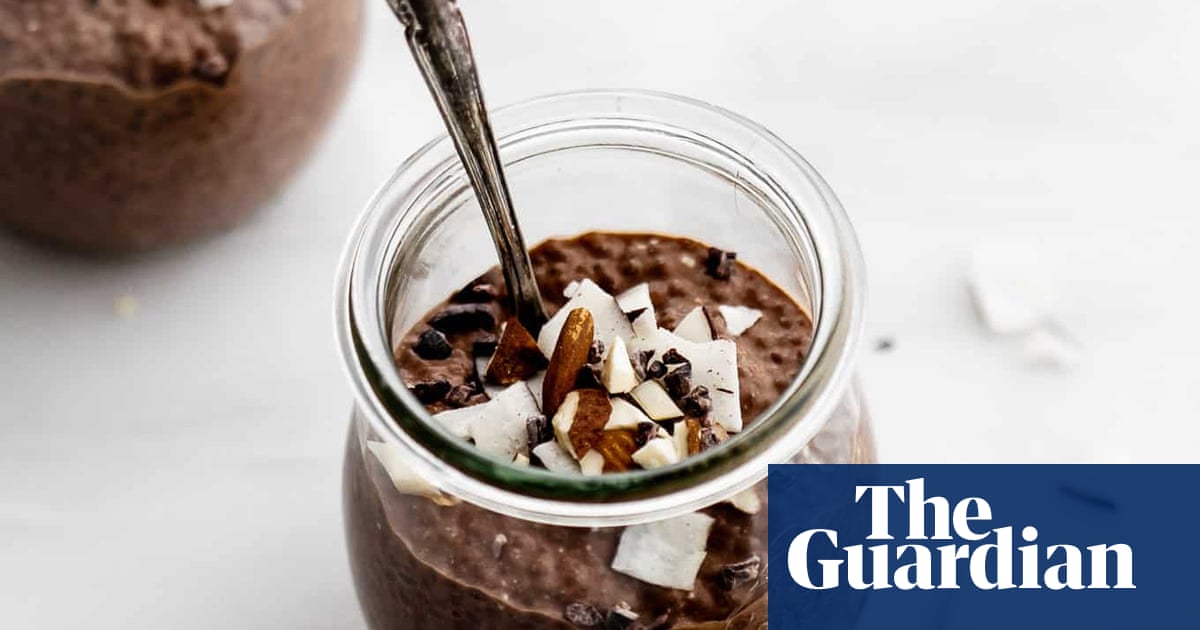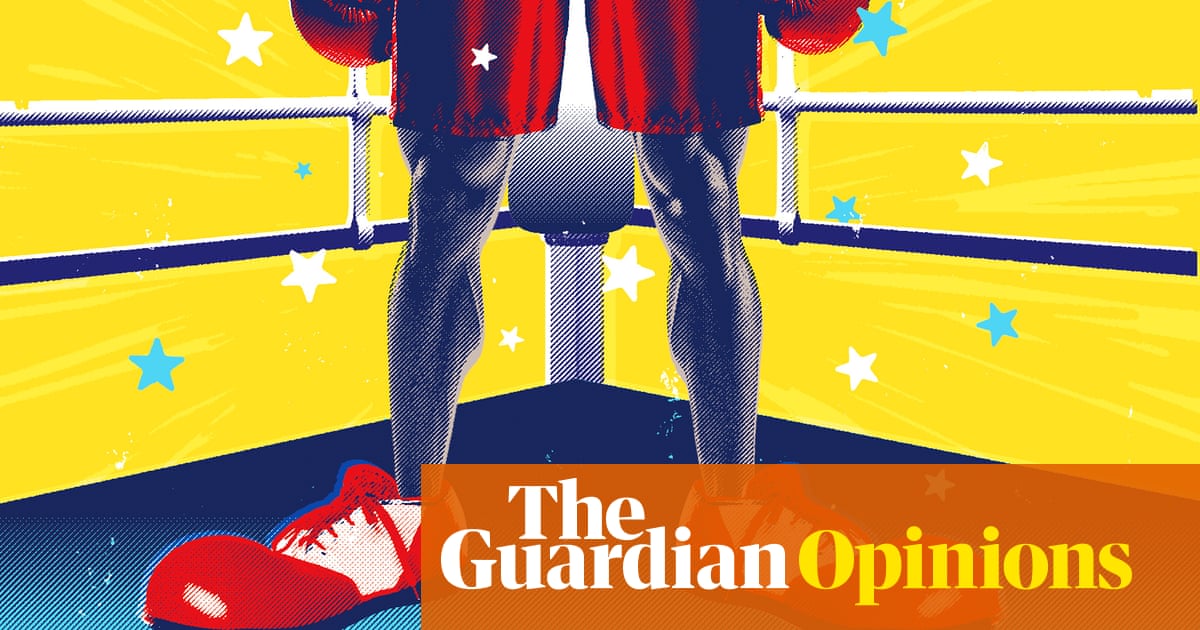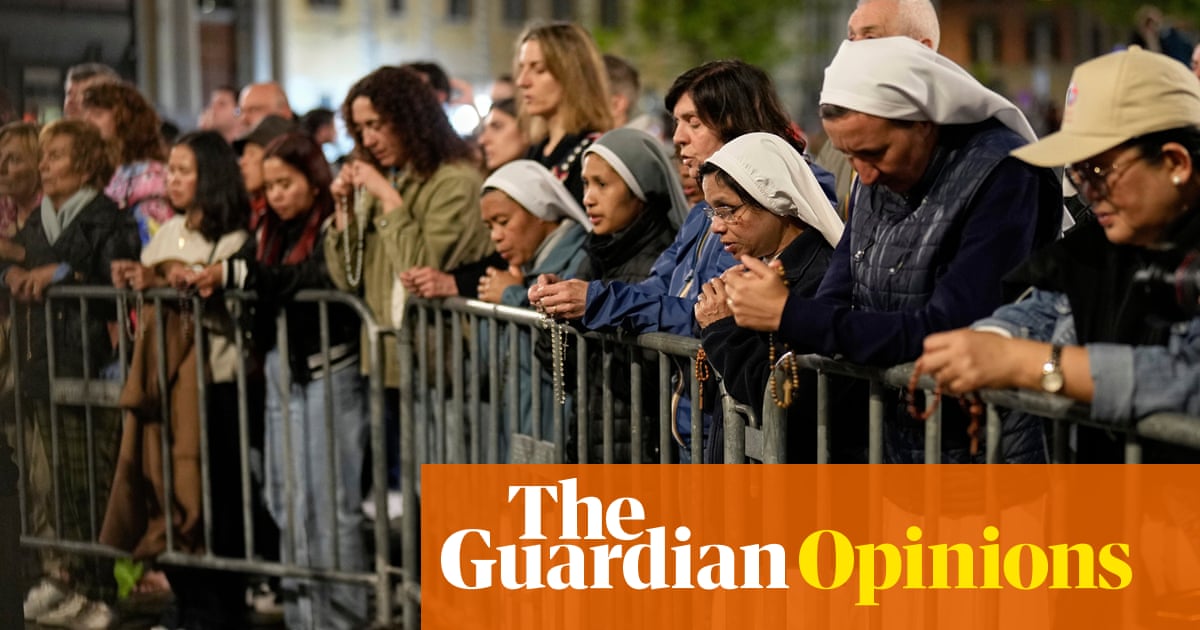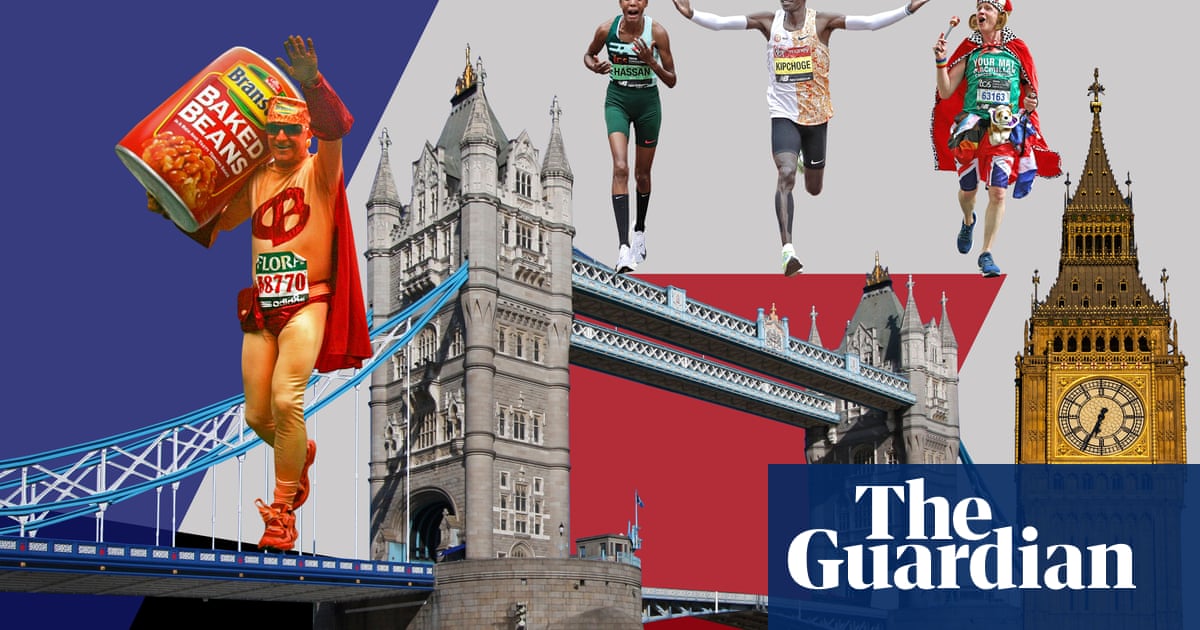Walking in steady procession, mittened hand in mittened hand, we descend in our swimsuits into the icy cold North Atlantic Ocean, singing. Usually the women sing an Icelandic song as they enter the waves, but this Saturday, for my benefit, they have chosen to sing You Are My Sunshine first. It’s 11am but the sun is only just rising, the ocean waves lapping and the sky shades of pink and purple. The big black rock in the middle of Reykjavík’s Skarfaklettur beach is dusted in snow. The water is apparently around zero degrees. When we are about waist high, my thighs go numb and the chain of hands breaks up. For a second I feel alone as I start to lose my breath and the others disappear into the water. But then Guðrún Tinna Thorlacius, known as Tinna, arrives to ask if I am OK. She looks at me with such sincerity and care that I cannot help but feel held. We breathe in for a count of three and out for another six, until I am ready to descend to my chest.
Members of the multigenerational ocean dipping group, Glaðari Þú (Happier You), meet several times a week at different spots around the Icelandic capital. I am here because it encapsulates a uniquely Icelandic idea – konur eru konum bestar (women are the best to women) – that has gained popularity in recent years as a guiding principle for how women should treat one another.
The phrase, created by women, is a contemporary inversion of an old saying – konur eru konum verstar (women are the worst to women). The idea is that rather than imitating the patriarchy by behaving in ways that make life worse for other women, they instead choose to uplift and support one another. It feels especially resonant in an age of polarisation and social media-fuelled comparison, where feminism, toxicity and exclusion have a tendency to get mixed up – to the extent that some interpretations of feminism can feel regressive. Could konur eru konum bestar be the Icelandic antidote to toxic “girlboss” culture?
Including Tinna, who co-runs the ocean-dipping sessions, there are 19 of us in today’s group. I attend with Þorgerður Jóhannsdóttir and Helga Gunnarsdóttir, who are ocean-dipping addicts. For four years they have been doing this three or four times a week. This year, they both turn 70. While the group is theoretically unisex, they mostly attract women, with their fun, playful sessions aimed at seeking the natural high that comes with plunging into the cold ocean. The meeting starts with a warmup and group meditation, huddled together in a circle on the beach, and ends with dancing and singing. The middle bit, when we go into the ocean, is short but unforgettable. Some women put their heads underwater, others do a few press-ups afterwards. When we emerge back on to the beach, our movements seem freer, inhibitions lighter and the mood brighter. “We have two boyfriends,” says Tinna, as she starts up the post-dip music: first playing Harry Belafonte’s Jump in the Line, then Via Con Me by Paolo Conte, both of which the group dances to in sync. As I try to copy their moves, the words “It’s wonderful, it’s wonderful, it’s wonderful / Good luck my baby!” being belted out with gleeful abandon around me, it is impossible not to feel communal joy.
I first experienced konur eru konum bestar long before I knew what it was. It is a feeling of comradeship between women, but also a way of being. It’s palpable in Reykjavík’s thermal swimming pools, in conversations with strangers and everyday interactions with female colleagues. Iceland is not without its issues when it comes to gender equality, but compared with the UK, US or other parts of Europe – where it can sometimes feel like competitiveness, jealousy and envy between women is actively encouraged by society – interactions with women here often feel staggeringly different.

But some say it hasn’t always been like that. Influencer Elísabet Gunnars and her friend Andrea Magnúsdóttir started putting the slogan “Konur eru konum bestar” on T-shirts in 2017, donating profits to charity. The idea came after multiple discussions about the sadness of women talking badly about each other and dragging each other down instead of being unified. “We wanted to change this saying and make it positive and at the same time remind women to stick together, support each other and build up other women,” says Elísabet.
Tinna says the secret to the success of Glaðari Þú is that they have created a community that can accommodate everything that life presents – including difficult emotions and experiences. “We have space for every woman, every type of woman, physically, mentally and emotionally,” she says. “We have room for every emotion.” That, she says, is what konur eru konum bestar is about.
Helga and Þorgerður agree that as well as the physical and psychological benefits, the sessions help them to be stronger and more supportive to women outside the group. “I’m stronger,” says Þorgerður, with quiet certainty. “I have more good friends and I feel better.” She pauses. “We can do so many things – whether it’s in the sea or something else. We can do it.”
This October marks the 50th anniversary of the 1975 women’s strike, when 90% of Iceland’s women stopped work (including housework and childcare) for a day to protest gender inequality, and 25,000 women descended on the capital’s city centre, calling for equal rights with men. It led to pivotal change in Iceland, including the establishment of a women’s political party, the Women’s Alliance, and the election of the world’s first ever female elected president of a country.
Today, Iceland is renowned as a global leader in the fight for gender equality, but there is still much left to fight for. In 2023, an estimated 100,000 women and non-binary people – including the then prime minister, Katrín Jakobsdóttir – went on strike from paid and unpaid work to highlight the gender pay gap and rates of gender-based and sexual violence, in the biggest protest the country has ever seen. This year, to mark the anniversary of the 1975 strike, dozens of feminist and labour organisations have come together for Women’s Year 2025 – 12 months of events dedicated to progressing gender equality.
Even in recent months there have been big developments. Since last month – when social democrat prime minister Kristrún Frostadóttir formed a government with two other female-led parties – for the first time in its history, Iceland has both a female president, Halla Tómasdóttir, and a female prime minister. At 36, Kristrún is also the country’s youngest ever leader and understood to be the world’s youngest serving state leader.

In order to succeed at the highest level, women are often told they need to behave like men, treating other women badly in the process. At a time when the manosphere can feel like it’s taking over the planet – as Donald Trump prepares to return to the White House – I am fascinated to know how konur eru konum bestar translates at the highest level. During a snowstorm, amid the dramatic scenery of Þingvellir national park, the site where Iceland’s parliament was founded around 930, I go to meet the new prime minister at her summer residence.
Kristrún says the government was not structured as a “female government” per se, as the three women in coalition talks – her, along with Inga Sæland of the centrist People’s Party and Þorgerður Katrín Gunnarsdóttir of the centre-right pro-European Liberal Reform Party – carry themselves differently. “We met at each other’s houses, we had coffee, we had waffles,” Kristrún laughs. “We took naps on each other’s sofas.” When they announced coalition talks were complete, they hugged. “There is something to be said about having the softness of female power in a difficult world, and that people can see that women can take and make difficult decisions but still have that soft power in them,” she says. “It’s important for young women to see, but it’s also important for young men out there that the stereotype of power isn’t just a guy in a suit.”
Will this be Iceland – or even the world’s – most feminist government yet? “At least we are standing on solid ground,” Kristrún says. Although she believes the biggest fights have already been fought in terms of feminism in the country, she says that the fight is constant, while adding that males will be as much of a focus as females for her government.
Not all Icelandic women share Kristrún’s view that feminism’s biggest battles have already been fought – or that the country is really living up to its values. At a cosy cafe in Reykjavík, Alondra Silva Muñoz, a businesswoman, public speaker and intersectionality and gender-equality advocate who moved to Iceland from Chile, says konur eru konum bestar is aspirational rather than something that has already been achieved. “It’s where we want to get to, but at the same time we know that there are hindrances.” She cites female politicians who have power but do not stop deportations of vulnerable women: “It makes you question, who are these women that are being ‘the best to women?’” Perhaps, she suggests, the philosophy is not being applied universally but reserved only for some women, “as long as they check certain boxes”. Immigrants who are not fluent in Icelandic can find it very difficult to find their way into the heart of society, she says. “From an intersectional point of view, there are a lot of systemic issues.”

Grace Achieng, founder and CEO of slow-fashion brand Gracelandic, grew up in Kenya and is the international relations representative for FKA, Iceland’s association of businesswomen. Although she says she has had a lot of support from Icelandic women, there is a tendency for people to select Icelanders over immigrants when opportunities – such as positions in organisations or representative bodies – come up. “People tend to just vote for the Icelander, even though representation now in society should be broader. But I think it’s a learning process.”
In such a small society – Iceland’s population is just under 400,000 – nepotism is almost normalised, says Alondra. Þorbjörg Þorvaldsdóttir, the project manager of Icelandic queer advocacy organisation Samtakanna ’78, agrees: “There’s always the question: ‘Why should they suffer for being part of that family?’”
The unity between Iceland’s LGBTQ+ and feminist organisations is a vital part of the movement’s strength, says Þorbjörg. Although she left the Social Democrats in June (she was a municipal councillor) over their immigration policy, she loved seeing the three female leaders announce their governing coalition. “Also, what I find really gratifying and nice is watching the men, the leaders of the other parties. They feel so frustrated and it’s so obvious.”
Whether connected by interests, hobbies, work or personal circumstances, women-only groups seem to play an essential role in connecting Icelandic women and, crucially, giving them a place to decompress and share that is outside their immediate family or social circles. And Iceland being Iceland, nature often has an outsized part to play.

Wading through knee-deep snow in the dark on a windy mountainside on the outskirts of the capital, I go on a morning hike to Úlfarsfell with Hafdís Huld Björnsdóttir and Inga Hrönn Sveinsdóttir. They started their group Fjallastelpur (Mountain Girls) during the pandemic with just one other friend as a way of getting out and about. Since then, the online platform has exploded into a group of more than 12,600 members. The women-only group aims to empower and encourage women by providing a space to talk about hiking routes, gear and sharing outdoor experiences. Hafdís and Inga also go camping at least once a month with a group of women. Each woman carries a tent so that everybody is self sufficient and learns the essential skills (although they have been known to take preprepared sushi with them). Having taken on many of Iceland’s highest peaks, they are now planning an eight-day backcountry ski trip to Greenland.
“For me, it’s inner peace that comes from facing nature and facing yourself,” says Hafdís, who is preparing to go on a solo trip to Svalbard soon. “The stress just melts away,” adds Inga, who since getting into hiking has become a member of the Icelandic search-and-rescue team. “And you’re in the situation where it’s just here and now.”
Having a space to do it with only women is important because it enables them to have the space for the deep conversations that they crave. Konur eru konum bestar feels good and those who live by it benefit from it too, says Inga. Other women being able to do difficult things acts as inspiration, says Hafdí. The feeling is, “If she can do it, I can do it.”

.png) 3 months ago
34
3 months ago
34













































